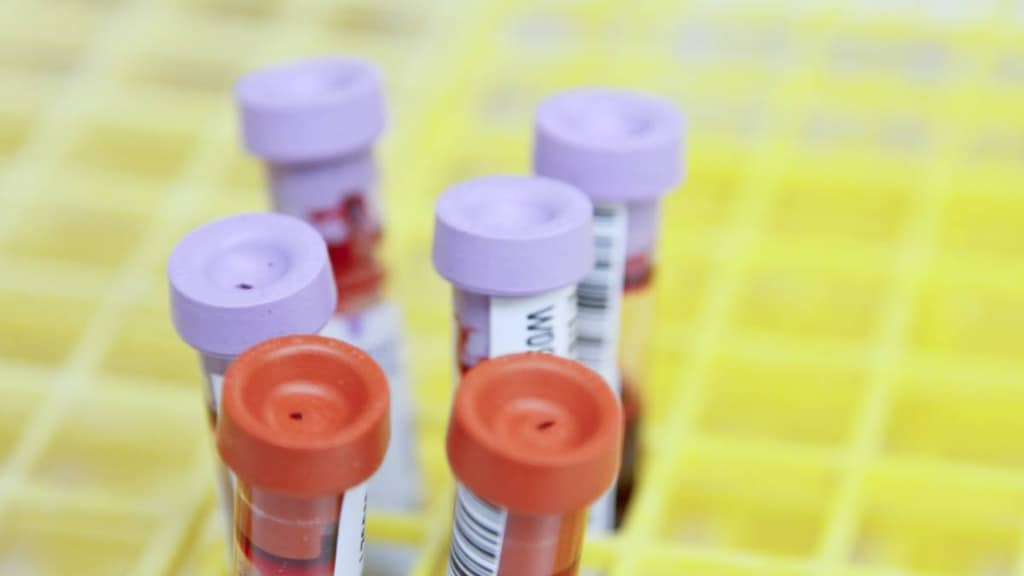What is ocrelizumab used for?
- Ocrelizumab is used to treat MS (multiple sclerosis).
Before taking ocrelizumab, tell your doctor:
- If you are allergic to ocrelizumab; any part of this medicine; or any other drugs, foods, or substances. Tell your doctor about the allergy and what signs you had.
- If you have an infection.
- If you have active hepatitis B infection.
This is not a list of all drugs or health problems that interact with ocrelizumab.
Tell your doctor and pharmacist about all of your drugs (prescription or OTC, natural products, vitamins) and health problems. You must check to make sure that it is safe for you to take ocrelizumab with all of your drugs and health problems. Do not start, stop, or change the dose of any drug without checking with your doctor.
What are some things I need to know or do while I take ocrelizumab?
- Tell all of your health care providers that you take ocrelizumab. This includes your doctors, nurses, pharmacists, and dentists.
- If you have had hepatitis B before or carry the virus, ocrelizumab can cause the virus to become active. This can lead to very bad and sometimes deadly liver problems. You will be tested for hepatitis B before starting ocrelizumab. You will need to watch for signs of hepatitis while taking ocrelizumab and for several months after stopping it. Talk with your doctor.
- Talk with your doctor before getting any vaccines. Use of some vaccines with ocrelizumab may either raise the chance of an infection or make the vaccine not work as well.
- Make sure you are up to date with all your vaccines before treatment with ocrelizumab. Talk with your doctor to find out when you need to get any vaccines before starting ocrelizumab.
- Infusion reactions have happened with ocrelizumab. Sometimes, these could be very bad or life-threatening. Talk with the doctor.
- Infusion reactions can happen up to 24 hours after ocrelizumab is given.
- Other drugs may be given to help with infusion side effects.
- You may have more chance of getting an infection. Wash hands often. Stay away from people with infections, colds, or flu.
- This medicine may add to the chance of getting some types of cancer. Talk with the doctor.
- Be sure to have regular breast exams. Your doctor will tell you how often to have these. You will also need to do breast self-exams as your doctor has told you. Talk with your doctor.
- Use birth control that you can trust to prevent pregnancy while taking ocrelizumab and for 6 months after stopping ocrelizumab.
- If you get pregnant while taking ocrelizumab or within 6 months after your last dose, call your doctor right away.
- If you used ocrelizumab when you were pregnant, tell your baby's doctor.
- Tell your doctor if you are breast-feeding. You will need to talk about any risks to your baby.
How is ocrelizumab best taken?
Use ocrelizumab as ordered by your doctor. Read all information given to you. Follow all instructions closely.
- It is given as an infusion into a vein over a period of time.
What do I do if I miss a dose?
- Call your doctor to find out what to do.
What are the side effects of ocrelizumab that I need to call my doctor about immediately?
WARNING/CAUTION: Even though it may be rare, some people may have very bad and sometimes deadly side effects when taking a drug. Tell your doctor or get medical help right away if you have any of the following signs or symptoms that may be related to a very bad side effect:
- Signs of an allergic reaction, like rash; hives; itching; red, swollen, blistered, or peeling skin with or without fever; wheezing; tightness in the chest or throat; trouble breathing, swallowing, or talking; unusual hoarseness; or swelling of the mouth, face, lips, tongue, or throat.
- Signs of infection like fever, chills, very bad sore throat, ear or sinus pain, cough, more sputum or change in color of sputum, pain with passing urine, mouth sores, or wound that will not heal.
- Signs of skin infection like oozing, heat, swelling, redness, or pain.
- Burning, itching, numbness, or tingling feeling in the genitals.
- Shingles.
- Shortness of breath.
- Flushing.
- Dizziness or passing out.
- Fever.
- Feeling tired or weak.
- Headache.
- Upset stomach.
- A fast heartbeat.
- A lump in the breast or breast soreness.
- Swelling in the arms or legs.
- Low mood (depression).
- A very bad brain problem called progressive multifocal leukoencephalopathy (PML) may happen with ocrelizumab. It may cause disability or can be deadly. Tell your doctor right away if you have signs like confusion, memory problems, low mood (depression), change in the way you act, change in strength on 1 side is greater than the other, trouble speaking or thinking, change in balance, or change in eyesight.
What are some other side effects of ocrelizumab?
All drugs may cause side effects. However, many people have no side effects or only have minor side effects. Call your doctor or get medical help if any of these side effects or any other side effects bother you or do not go away:
- Signs of a common cold.
- Back pain.
- Diarrhea.
These are not all of the side effects that may occur. If you have questions about side effects, call your doctor. Call your doctor for medical advice about side effects.
You may report side effects to the FDA at 1-800-332-1088. You may also report side effects at https://www.fda.gov/medwatch.
If overdose is suspected:
If you think there has been an overdose, call your poison control center or get medical care right away. Be ready to tell or show what was taken, how much, and when it happened.
How do I store and/or throw out ocrelizumab?
- If you need to store ocrelizumab at home, talk with your doctor, nurse, or pharmacist about how to store it.
Consumer information use and disclaimer
- If your symptoms or health problems do not get better or if they become worse, call your doctor.
- Do not share your drugs with others and do not take anyone else's drugs.
- Keep all drugs in a safe place. Keep all drugs out of the reach of children and pets.
- Throw away unused or expired drugs. Do not flush down a toilet or pour down a drain unless you are told to do so. Check with your pharmacist if you have questions about the best way to throw out drugs. There may be drug take-back programs in your area.
- This medicine comes with an extra patient fact sheet called a Medication Guide. Read it with care. Read it again each time ocrelizumab is refilled. If you have any questions about ocrelizumab, please talk with the doctor, pharmacist, or other health care provider.
- If you think there has been an overdose, call your poison control center or get medical care right away. Be ready to tell or show what was taken, how much, and when it happened.
This information should not be used to decide whether or not to take ocrelizumab or any other medicine. Only the healthcare provider has the knowledge and training to decide which medicines are right for a specific patient. This information does not endorse any medicine as safe, effective, or approved for treating any patient or health condition. This is only a brief summary of general information about this medicine. It does NOT include all information about the possible uses, directions, warnings, precautions, interactions, adverse effects, or risks that may apply to ocrelizumab. This information is not specific medical advice and does not replace information you receive from the healthcare provider. You must talk with the healthcare provider for complete information about the risks and benefits of using this medicine.




